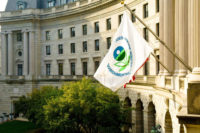Bosses of U.K. water and wastewater utilities that are responsible for illegal, serious pollution should be jailed, said Emma Howard Boyd, head of the government's Environment Agency. She made the recommendation along with release of the agency’s annual report on the nine major companies, which recorded the worst environmental performance in a decade.
"It’s appalling that water companies’ performance on pollution has hit a new low," said Howard Boyd. While executives and investors have been "handsomely rewarded," company directors let this happen, she added.
Calling for stiffer infringement penalties she noted that "fines currently handed down by the courts often amount to less than a chief executive’s salary ... investors should no longer see England’s water monopolies as a one-way bet."
Assessed on a one-to-four-star rating, the sector’s performance on pollution was "much worse than previous years," with Southern Water and South West Water achieving one star, according to the report. Seven companies saw increases in their serious pollution incidents, totaling the highest number since 2013. Only three maintained four stars, "although certain improvements are still required."
Since 2015, agency prosecutions against water companies have secured around $163 million in fines for illegal discharges. By far the largest fine, at $107 million, was imposed last year on Southern Water for thousands of illegal sewage discharges into rivers and coastal waters of three counties.
The company admitted causing 6,971 illegal discharges over 61,704 hours, seriously damaging commercial oyster beds. It was accused of deliberately presenting a misleading picture of compliance to the agency.
"We failed to protect our precious environment in Southern England," admitted Southern Water's chair Keith Lough. "For that we are profoundly sorry and as we have made clear, our customers will not pay a penny towards our fine."
Responding to the agency's annual report, Christine McGourty, CEO of the trade association Water U.K., said the "industry must do better."
While some companies performed well, "the total number of serious pollution incidents was too high, bucking the recent trend of year-on-year improvements. Tackling this is our single biggest priority and every company has a comprehensive plan in place to make that happen," she added.
Based on river catchments and responsible for water supply and wastewater treatment, the nine companies are the product of water authority privatization in 1989. According to a study by the Guardian newspaper, the companies paid a total of $67 billion in dividends to investors between 1991 and 2019.




Post a comment to this article
Report Abusive Comment